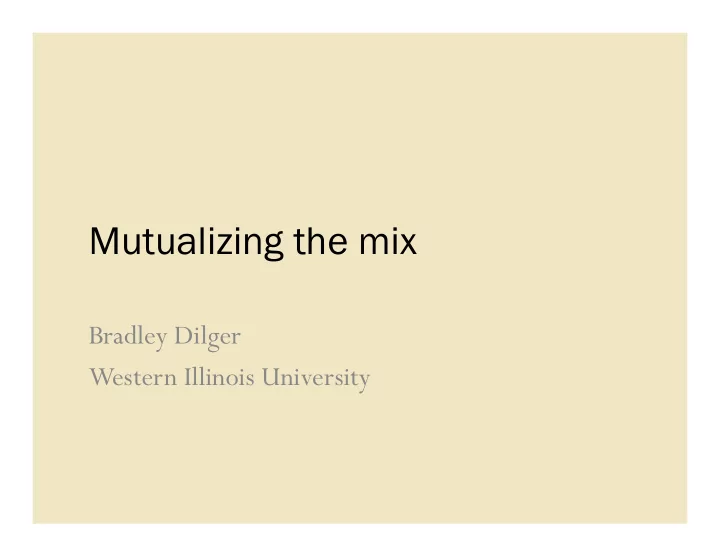

Mutualizing the mix Bradley Dilger Western Illinois University
Pough’s call for proposals How do we rethink our strategies in dealing with the national, state and local policies that have an impact on our classrooms and the students we teach? [...] Louisville, our convention site, is a city that has been remixing itself since the early 1800s when the invention of the steamboat caused industrial development to explode, thus paving the way for it to become the largest city in Kentucky.
CCCC research committee event The C’s Research Committee is sponsoring a panel entitled “Remixing our scholarship for audiences and stakeholders outside of Cs.” This panel of impressive scholar/researchers will discuss how they have been able to “break the disciplinary barrier” in terms of sharing their research.
Research committee questions 1. What communication or publication venues should Cs members consider in order to obtain a larger audience for their research? 2. What are some recommended strategies for leveraging our research to influence stakeholders outside our organization? 3. What are some examples of arguments based upon our research that have failed to influence those outside of Cs and what lessons can we learn from these failures?
Research committee questions 4. What groundwork do we as an organization need to undertake before we can effectively reach the ears of larger audiences? 5. How might our research agendas need to change if we want to maximize our influence with administrators and other non-Cs stakeholders?
Crosstalk
Pough’s call for proposals I’d like for the 61st meeting of CCCC to encourage cross talk within the field and begin to revisit, rethink, revise and renew our field.
links accessibility standards
We must reconceptualize the link as a core part of the database and an essential component of every unit of discourse we value.
JAC issue pages
CCCC program (1/2)
CCCC program (2/2)
Links are crucial for formal, published scholarship, but also for work such as weblogs, notes, syllabi, and conference presentations.
The permalink (1/2) It may seem like a trivial piece of functionality now, but it was effectively the device that turned weblogs from an ease-of-publishing phenomenon into a conversational mess of overlapping communities. For the first time it became relatively easy to gesture directly at a highly specific post on someone else’s site and talk about it….
The permalink (2/2) Discussion emerged. Chat emerged. And—as a result — friendships emerged or became more entrenched. The permalink was the first—and most successful— attempt to build bridges between weblogs. It existed way before Trackback and I think it’s been more fundamental to our development as a culture than comments.
Fixing our links 1. Give everything a URL and create direct links to the resource, or pages which link to the resource. 2. Strive for link stability. Use DOI and similar mechanisms. Update links and eliminate outdated or material. 3. Concatenate links into feeds.
ACM Portal (1/2)
ACM Portal (2/2)
Accessibility means ensuring everyone can read, hear, or touch their way through our discourses. Our cross talk must be accessible to all kinds of users, in all kinds of contexts.
Library budgets
Restricting access to our scholarship, much of which is at least partially funded by the public, is the wrong choice for us now and in the future.
Audience continuum Imagine cross talk between your area of rhetoric & composition, and: 1. the general public 2. other academic disciplines 3. other areas of English studies 4. other areas of rhetoric & composition 5. inside your area itself
Abstract from CF 21 (1/2) This article looks closely at some of the lingering stereotypes that Composition Studies holds toward Web surfing and queries the resulting literacy hierarchy against our students’ reading and writing practices that take place online. This article claims that while good progress has been made in the way of revising twenty-first century definitions of (digital) composing, the academy has yet to fully revisit its boundaries of legitimacy surrounding (digital) reading….
Abstract from CF 21 (2/2) … Additionally, this article contests the academy’s use of technology vis-á-vis email, Blackboard, or blogging as a placating attempt to integrate technology into the classroom without genuinely validating our students’ dominant literacies or their digital lives. This article leans on the theories of feminist composition pedagogy as it calls for the field to decenter its authority and revise curricula to incorporate critical digital literacies.
Star & Lampland on standards We hope to contribute here, in a modest way, to the dulling of the impulse to standardize everything that seems to grip modern organizations. We are not, in any sense, against standardizing—only against society’s romance with it. Standards and their Stories
Arxiv.org (1/2)
Arxiv.org (2/2)
Journal web standards 1. Facilitate access to journal web presences. 2. Provide a high degree of functionality. 3. Whenever possible, facilitate connections with other scholarly discourse. 4. Help readers shape the future of these standards. 5. Help authors achieve compliance with these standards. 6. Help editors implement these standards. 7. Follow established standards for metadata exchange. 8. Provide incentives for participation.
Journal web standards, #5 • Help authors achieve compliance with these standards. – Provide or link to templates and guidelines which aid the production of content. – Seek and value feedback from authors about the effect of the standards on the production and distribution of scholarship.
Open standards facilitate diverse collaborations. I hope to promote their constructive use through advocacy, documentation, and example.
Recommend
More recommend